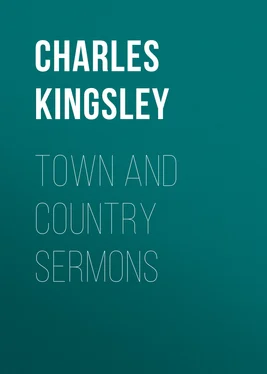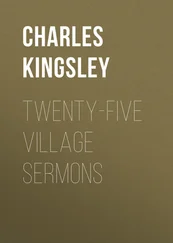Charles Kingsley - Town and Country Sermons
Здесь есть возможность читать онлайн «Charles Kingsley - Town and Country Sermons» — ознакомительный отрывок электронной книги совершенно бесплатно, а после прочтения отрывка купить полную версию. В некоторых случаях можно слушать аудио, скачать через торрент в формате fb2 и присутствует краткое содержание. Жанр: foreign_prose, foreign_religion, Философия, foreign_psychology, foreign_antique, на английском языке. Описание произведения, (предисловие) а так же отзывы посетителей доступны на портале библиотеки ЛибКат.
- Название:Town and Country Sermons
- Автор:
- Жанр:
- Год:неизвестен
- ISBN:нет данных
- Рейтинг книги:5 / 5. Голосов: 1
-
Избранное:Добавить в избранное
- Отзывы:
-
Ваша оценка:
- 100
- 1
- 2
- 3
- 4
- 5
Town and Country Sermons: краткое содержание, описание и аннотация
Предлагаем к чтению аннотацию, описание, краткое содержание или предисловие (зависит от того, что написал сам автор книги «Town and Country Sermons»). Если вы не нашли необходимую информацию о книге — напишите в комментариях, мы постараемся отыскать её.
Town and Country Sermons — читать онлайн ознакомительный отрывок
Ниже представлен текст книги, разбитый по страницам. Система сохранения места последней прочитанной страницы, позволяет с удобством читать онлайн бесплатно книгу «Town and Country Sermons», без необходимости каждый раз заново искать на чём Вы остановились. Поставьте закладку, и сможете в любой момент перейти на страницу, на которой закончили чтение.
Интервал:
Закладка:
And he will do that, I believe, just as far as he keeps in mind what a wonderful and useful thing his body is; what a perpetual token and witness to him of the unspeakable greatness and wisdom of God; just in proportion as he says day by day, with the Psalmist, ‘Thou hast fashioned me behind and before, and laid thine hand upon me. Such knowledge is too wonderful and excellent for me; I cannot attain unto it. Whither shall I go, then, from thy Spirit; or whither shall I go from thy presence? If I climb up into heaven, thou art there. If I go down to hell, thou art there also. If I take the wings of the morning, and remain in the uttermost parts of the sea, even there also shall thy hand lead me, thy right hand shall hold me.’
Just in proportion as he recollects that, will he utter from his heart the prayer which follows, ‘Try me, O God, and seek the ground of my heart; prove me, and examine my thoughts. Look well if there be any way of wickedness in me, and lead me in the way everlasting.’
SERMON VII. THE VICTORY OF FAITH
( First Sunday after Easter .)
1 John v. 4, 5. Whatsoever is born of God overcometh the world: and this is the victory which overcometh the world, even our faith. Who is he that overcometh the world, but he that believeth that Jesus is the Son of God?
What is the meaning of ‘overcoming the world?’ What is there about the world which we have to overcome? lest it should overcome us, and make worse men of us than we ought to be. Let us think awhile.
1. In the world all seems full of chance and change. One man rises, and another falls, one hardly knows why: they hardly know themselves. A very slight accident may turn the future of a man’s whole life, perhaps of a whole nation. Chance and change—there seems to us, at times, to be little else than chance and change. Is not the world full of chance? Are not people daily crushed in railways, burnt to death, shot with their own guns, poisoned by mistake, without any reason that we can see, why one should be taken, and another left? Why should not an accident happen to us, as well as to others? Why should not we have the thing we love best snatched from us this day? Why not, indeed? What, then, will help us to overcome the fear of chances and accidents? How shall we keep from being fearful, fretful, full of melancholy forebodings! Where shall we find something abiding and eternal, a refuge sure and steadfast, in which we may trust, amid all the chances and changes of this mortal life? St. John tells us—In that within you which is born of God.
2. In the world so much seems to go by fixed law and rule. That is even more terrible to our minds and hearts—to find that all around us, in the pettiest matters of life, there are laws and rules ready made for us, which we cannot break; laws of trade; laws of prosperity and adversity; laws of health and sickness; laws of weather and storms; laws by which not merely we, but whole nations, grow, and decay, and die.—All around us, laws, iron laws, which we do not make, and which we dare not try to break, lest they go on their way, and grind us to powder.
Then comes the awful question, Are we at the mercy of these laws? Is the world a great machine, which goes grinding on its own way without any mercy to us or to anything; and are we each of us parts of the machine, and forced of necessity to do all we do? Is it true, that our fate is fixed for us from the cradle to the grave, and perhaps beyond the grave? How shall we prevent the world from overcoming us in this? How shall we escape the temptation to sit down and fold our hands in sloth and despair, crying, What we are, we must be; and what will come, must come; whether it be for our happiness or misery, our life or death? Where shall we find something to trust in, something to give us confidence and hope that we can mend ourselves, that self-improvement is of use, that working is of use, that prudence is of use, for God will reward every man according to his work? St. John tells us—In that within you which is born of God.
3. Then, again, in the world how much seems to go by selfishness. Let every man take care of himself, help himself, fight for himself against all around him, seems to be the way of the world, and the only way to get on in the world. But is it really to be so? Are we to thrive only by thinking of ourselves? Something in our hearts tells us, No. Something in our hearts tells us that this would be a very miserable world if every man shifted for himself; and that even if we got this world’s good things by selfishness, they would not be worth having after all, if we had no one but ourselves to enjoy them with. What is that? St. John answers—That in you which is born of God. It will enable you to overcome the world’s deceits, and to see that selfishness is not the way to prosper.
4. Once, again; in the world how much seems to go by mere custom and fashion. Because one person does a thing right or wrong, everybody round fancies himself bound to do likewise. Because one man thinks a thing, hundreds and thousands begin to think the same from mere hearsay, without examining and judging for themselves. There is no silliness, no cruelty, no crime into which people have not fallen, and may still fall, for mere fashion’s sake, from blindly following the example of those round him. ‘Everybody does so; and I must. Why should I be singular?’ Or, ‘Everybody does so; what harm can there be in my doing so?’
But there is something in each of us which tells us that that is not right; that each man should act according to his own conscience, and not blindly follow his neighbour, not knowing whither, like sheep over a hedge; that a man is directly responsible at first for his own conduct to God, and that ‘my neighbours did so’ will be no excuse in God’s sight. What is it which tells us this? St. John answers, That in you which is born of God; and it, if you will listen to it, will enable you to overcome the world’s deceit, and its vain fashions, and foolish hearsays, and blind party-cries; and not to follow after a multitude to do evil.
What, then, is this thing? St. John tells us that it is born of God; and that it is our faith. Faith will enable us to overcome the world. We shall overcome by believing and trusting in something which we do not see. But in what? Are we to believe and trust that we are going to heaven? St. John does not say so; he was far too wise, my friends, to say so: for a man’s trusting that he is going to heaven, if that is all the faith he has, is more likely to make the world overcome him, than him overcome the world. For it will make him but too ready to say, ‘If I am sure to be saved after I die, it matters not so very much what I do before I die. I may follow the way of the world here, in money-making and meanness, and selfishness; and then die in peace, and go to heaven after all.’
This is no fancy. There are hundreds, nay thousands, I fear, in England now, who let the world and its wicked ways utterly overcome them, just because their faith is a faith in their own salvation, and not the faith of which St. John speaks—Believing that Jesus is the Son of God.
But some may ask, ‘How will believing that Jesus is the Son of God help us more than believing the other? For, after all, we do believe it. We all believe that Jesus is the Son of God: but as for overcoming the world, we dare not say too much of that. We fear we are letting the world overcome us; we are living too much in continual fear of the chances and changes of this mortal life. We are letting things go too much their own way. We are trying too much each to get what he can by his own selfish wits, without considering his neighbours. We are following too much the ways and fashions of the day, and doing and saying and thinking anything that comes uppermost, just because others do so round us.’
Читать дальшеИнтервал:
Закладка:
Похожие книги на «Town and Country Sermons»
Представляем Вашему вниманию похожие книги на «Town and Country Sermons» списком для выбора. Мы отобрали схожую по названию и смыслу литературу в надежде предоставить читателям больше вариантов отыскать новые, интересные, ещё непрочитанные произведения.
Обсуждение, отзывы о книге «Town and Country Sermons» и просто собственные мнения читателей. Оставьте ваши комментарии, напишите, что Вы думаете о произведении, его смысле или главных героях. Укажите что конкретно понравилось, а что нет, и почему Вы так считаете.












